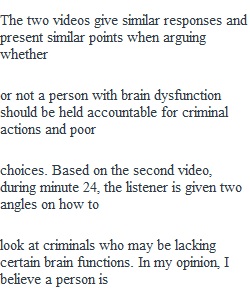


Q Adrian Raine, a professor at the University of Pennsylvania and author of "Autonomy of Violence" is a well know scholar exploring the connection between biology and crime. The following two videos give a visual glimpse into a biosocial perspective of crime. While research continues to show the link between the biological and the criminal, it can also create new ethical questions concerning the accountability of crime. Does knowing that a person's genetic make-up or neuro capacity influences a person's behavior impact how/if we hold a criminal accountable for his or her actions? In other words, if a person's biology doesn't allow a person to make the right choice (a noncriminal one), how can we as a society hold that person accountable? Is the action "truly" their choice? We usually don't hold kids or people with a diminished capacity to the same standards, so why would this be any different? View the 2 videos and write a 1/2 to a 1-page reaction. (Second video minutes 19:30 to 26:30) Video 1 https://www.youtube.com/watch?v=J-D2iWjUWiM&t=126sLinks to an external site. Video 2 Minutes 19:30 to 26:30 PreviousNext
View Related Questions